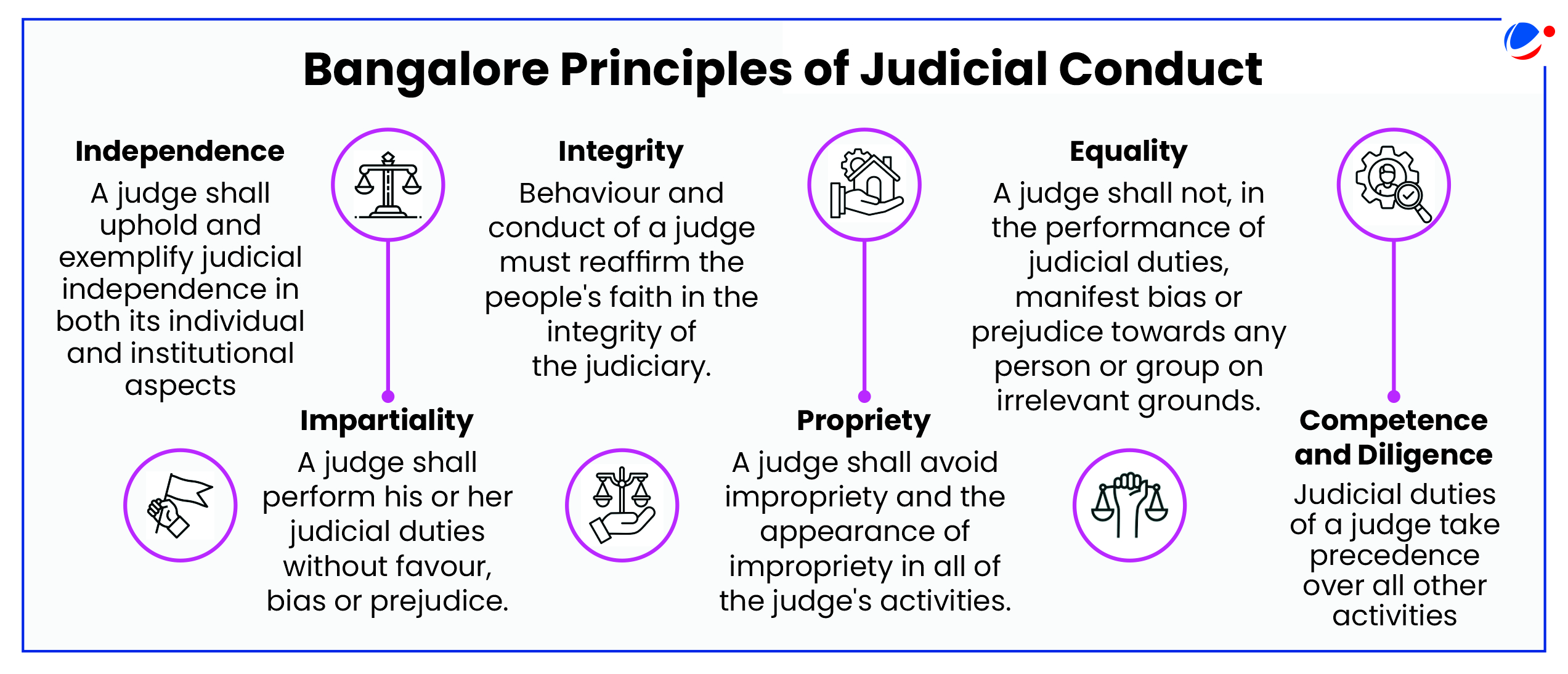Why in the News?
The discovery of wads of cash at the residence of Delhi High Court judge has raised concerns regarding accountability in India's higher judiciary.
More on the News
Recent events have intensified the debate on judicial accountability:
- Previously, a former Chief Justice of India (CJI) joined a panel investigating sexual harassment charges against himself.
- Supreme Court took suo motu cognizance and stayed the Lokpal's ruling which stated that High Court Judges are amenable to Lokpal's jurisdiction.
Existing Key Mechanism for Ensuring accountability
- Impeachment: Governed by Articles 124, 217, 218 of the constitution and the Judges Inquiry Act, 1968.
- In-House Mechanism of 1999: Based on two important charters governing judicial ethics— the Restatement of Values of Judicial Life 1997 and the Bangalore Principles of Judicial Conduct 2002.
- The CJI can receive complaints against the conduct of the Judges of the Supreme Court and the Chief Justice of the High Courts. High Court Chief Justices can handle complaints within their courts.
- A three-member committee examines the complaint and may recommend removal or criminal action. For instance, Justice Soumitra Sen and Nirmal Yadav were found guilty through such committees.
- In case of complaint against a HC judge, committee consists of two Chief Justices of HCs other than the HC to which judge belongs and one HC judge.
- In case of complaint against a HC Chief Justice, committee consists of a SC judge and two Chief Justices of other HCs.
- In case of complaint against a SC judge, committee consists of three SC judges.

Concerns Surrounding Judicial Accountability in India
Conflict with Judicial Independence | Any effort at ensuring judicial accountability is often seen as interfering with judicial independence.
|
Complex Impeachment Process | Constitutional mechanism of impeachment is too complex to implement and fails to hold judges accountable, thus, no judge has ever been removed through impeachment.
|
No Mandatory Asset Disclosure Norm | In 1997, the Supreme Court adopted a resolution the 'judges should declare all assets including those of spouses and dependents to the CJI'.
|
Limited checks and balances | Judiciary self-governs most of its aspects like appointment of judges, procedures governing behaviour of judges, inquiry mechanisms etc. |
Other Provisions Hindering Accountability |
|
Way Forward to Ensure Judicial Accountability
- Judicial Standards and Accountability Bill: It was introduced in 15th Lok Sabha but lapsed due to dissolution of Lok Sabha.
- Parliament may introduce a new bill for setting judicial standards and establishing a proper mechanism for inquiries into judicial misconduct without giving excessive control to the legislature or the executive.
- National Judicial Commission (NJC): Proposed by Law Commission of India reports (80th & 121st) to handle appointments and misconduct investigations.
- In addition to judicial member NJC is advised to keep non-Judicial member.
- Permanent Disciplinary Committee: A committee with members from judiciary should be set up at the central level to deal with complaints against judges.
- The committee can give a warning, reprimand or advisory in case of minor instance of misbehaviour while request setting up judicial inquiry committee under the Judges Inquiry Act in case of major misconduct.
- Judicial Oversight: A continuous performance evaluation mechanism may be devised for judges where lapses in standards, or questionable conduct by individual judges immediately come to light.







